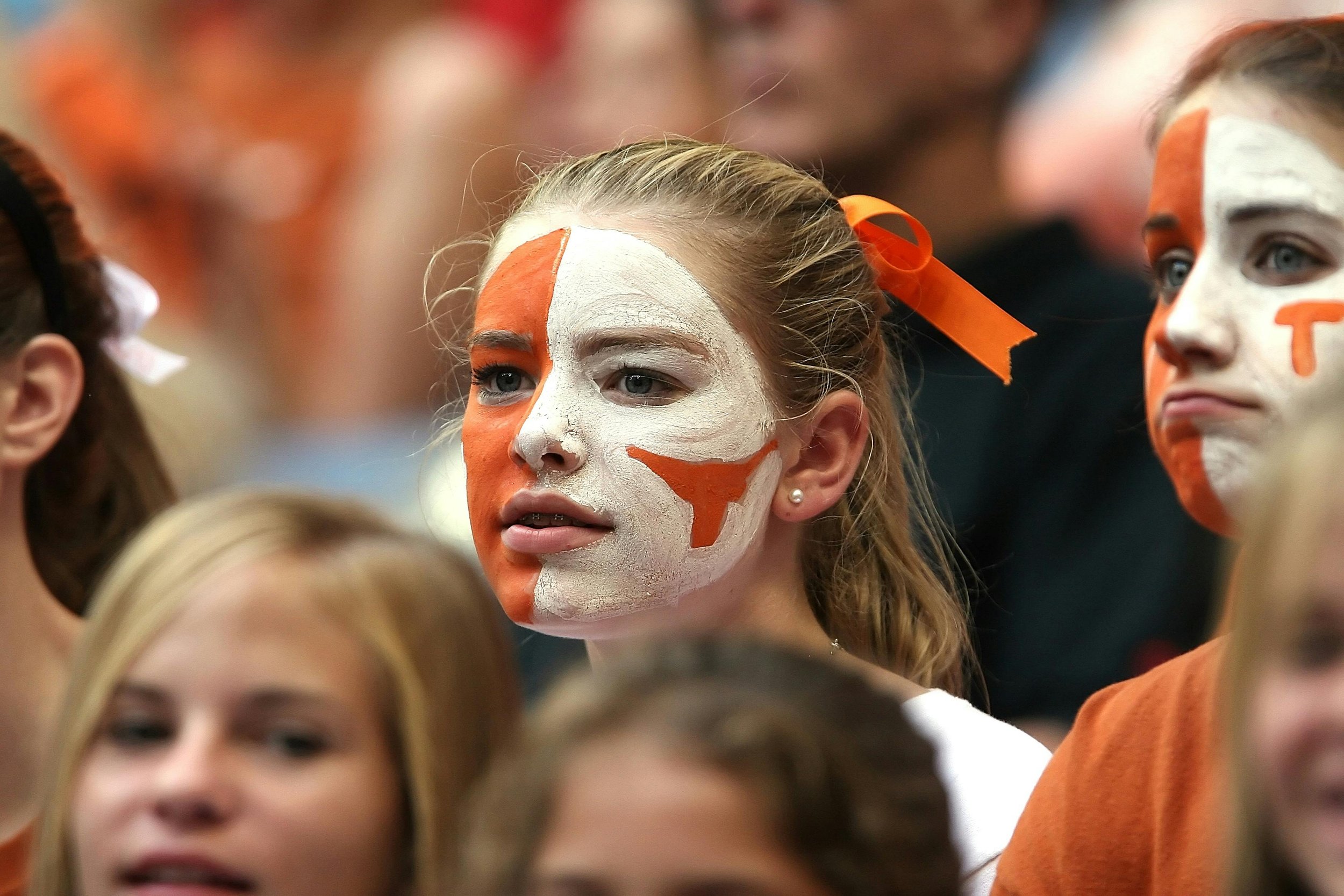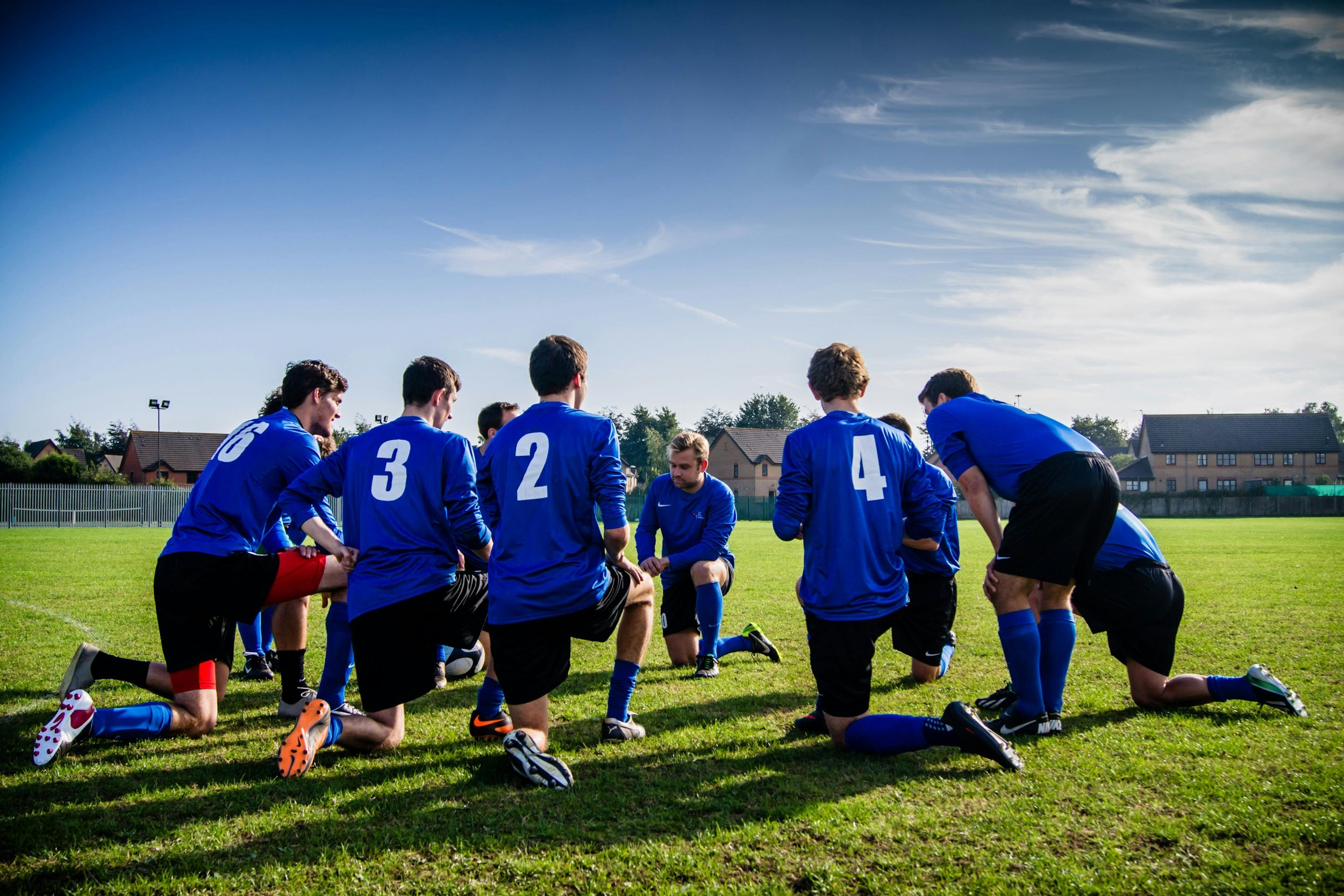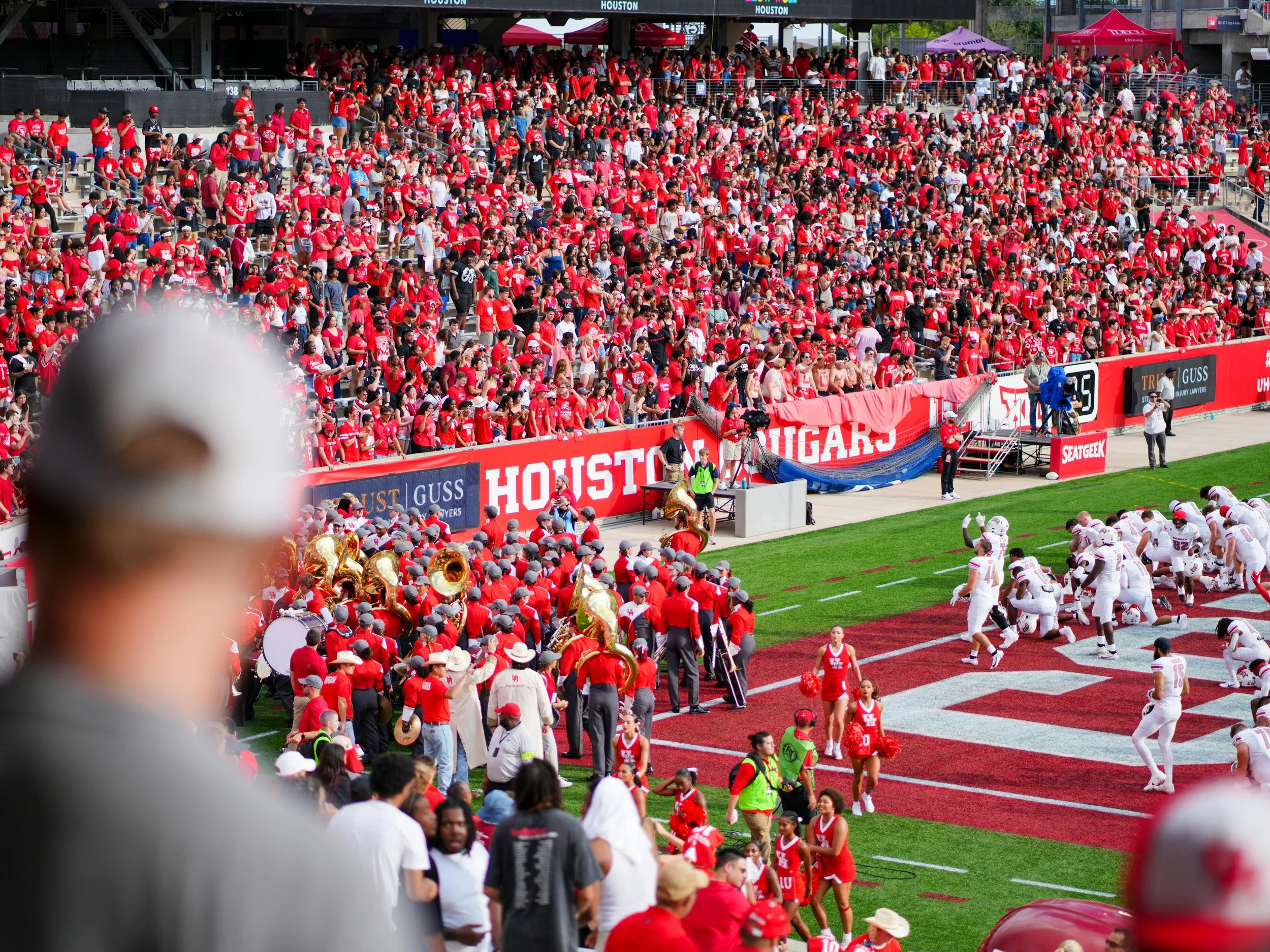Slam Your Vibe: How Sports Make You in College
By Jaylen Harris
Spring 2025

Game On: Why Sports Rock College Life
Starting college is like stepping onto a new playing field—you’re excited, nervous, and figuring out who you are. Sports can be your guide, whether you're dunking on the court, cheering in the stands, or kicking back with friends at a game. They spark connections, teach you skills like grit and teamwork, and help you discover what makes you shine. From pickup games to packed stadiums, sports are a universal language on campus, inviting you to join the fun no matter your background or major.
Sports don’t just unite you with others—they’re a big deal for colleges, boosting spirit and bringing in revenue. Net Natives, Sarah Nash, "The Power of Collegiate Sports", says, “Sports spark a tight campus community—nothing beats rocking your school colors!” That vibe hits hard on game day, when you and thousands of others chant as one. It’s more than a game—it's a shared pulse that makes college unforgettable.
If you’re a student-athlete, your sport is like a compass, steering your goals and giving you purpose. Practices and games shape your days, pushing you to grow. But even if you’re not lacing up, being a fan or hitting intramural fields builds bonds and confidence. Think of that time you high-fived a stranger after a buzzer-beater—those moments stick. Sports, in any form, weave into your college story, helping you find your place.
This post is your playbook for how sports shape your college vibe—boosting your grades, mental health, and friendships. Packed with insights from experts and students I talked to, plus research from top sources, it’s for all college students—freshmen finding their footing, seniors savoring last games, athletes, or fans just soaking up the energy. We’ll explore why sports matter, how they build you up, and ways to dive in, no matter your style. Ready? Let’s hit the ground running and see why sports are the heartbeat of campus life.
Sports Fever: The Heartbeat of Campus
College sports are more than games—they’re the soul of your campus. TIME, Taylor Branch, The Shame of College Sports notes, “Sports fire up your campus vibe.” Picture this: you’re in a sea of fans, screaming as your team scores. That energy links you with profs, alums, and even strangers, all buzzing with pride. It’s a vibe no lecture hall can match.
Without sports, your campus might feel like just another place. GMTM, A Few Reasons Why Americans Are So Obsessed With College Sports adds, “Sports pump up spirit and connect you with others.” Football games or basketball showdowns at schools like North Central College turn quiet weekends into epic rallies. Many students feel closer to their school through sports events, as [GMTM] suggests. That spirit hits the same whether at a D1 powerhouse or a small college.
This isn’t just about big games—think club teams, intramurals, or even esports tournaments. Every cheer or high-five pulls you into your college’s story. And it’s not all rosy: rivalries can get heated, and losses sting. But even those lows teach you resilience, uniting you with others through shared highs and heartbreak. That’s the magic of sports fever—your ticket to belonging. Now, let’s dive into how sports shape you on a deeper level.

Team Spirit, True You: Finding Yourself in Sports
Sports aren’t just about winning—they’re about finding your identity. I talked to Krystina Sarff, Assistant Professor of Sport Management at North Central College, who gets this. “Sports create belonging,” Sarff explains. “They connect you with teammates and coaches, becoming a big part of you.” If you’re an athlete, your sport might define you—like how practices carve out your discipline or games spark your fire.
Research digs deeper. Historic Baseball's James Reynolds, "Baseball’s Influence on Youth Culture and Identity," notes, “Team sports smash walls, uniting you with new faces.” Take soccer: you learn to trust passing to a teammate or grit when you’re down a goal. Those lessons shape you off the field, too—maybe you lead a group project with that same confidence. I remember a friend who joined rugby and found her voice, going from shy to unstoppable. Sports can do that for you, breaking barriers and linking you with people you’d never meet otherwise.
Balance isn’t easy, though. I talked to Douglas Czurylo, Adjunct Assistant Professor at North Central College and Senior Director at Kane County Cougars Baseball. He sees the grind up close. “If you’re an athlete, your team’s like family,” Czurylo says. “Balancing that with classes is tough.” Practices eat time, and injuries can shake you up. Yet, that struggle builds your core—who you are when the pressure’s on. Not an athlete? Joining a fan club or pick-up game still gives you that team vibe, helping you grow into yourself.
This isn’t just for jocks. Maybe you’re a theater kid who tried intramural volleyball and found a crew. Or you’re an international student bonding over cricket matches. Sports let you try on identities—leader, supporter, risk-taker—and keep what fits. They’re a safe space to mess up, learn, and shine, shaping your college years into something epic. Next up, let’s see how sports lift your mind.
Mind Games: How Sports Boost Your Mood
College can stress you out—exams, roommates, that looming “what’s next?” Sports are your secret weapon for staying grounded. Moving your body—whether sprinting or tossing a frisbee—fires up endorphins, those feel-good chemicals that melt worries. It’s not just talk: science says it works, and you can feel it fast. Even a short game can ease your stress. Per the American Psychiatric Association, “Americans and Psychiatrists Agree: Sports Can Be Good for Mental Health.
Here’s how sports help your mind:
Ease stress: Like a reset button, a quick game chills your anxiety.
Build confidence: Nailing a shot or chanting with fans makes you unstoppable.
Teach resilience: You learn to shake off losses, per Dr. Sarff. She says, “Sports show you how to bounce back—skills you need for life.”
Exercise, like a pickup basketball game, can lift your mood fast. I chatted with Aditya Patel, a student at DePaul University, who swears by fandom. “Watching my team lets me vent emotions,” Patel shares. “It’s a way to deal with life.” Whether you're sweating it out or cheering, sports give you a break from overthinking.
But there’s a catch—don’t let fandom own you. Psychology Today, Patrick McElwaine, The Psychology of Sports Fandom: Balancing Wins and Losses, notes, “Fans like you glow when your team wins.” A loss? That can hit hard. Patel admits he’s skipped study sessions after a bad game. The trick is balance: use sports to lift you up, not drag you down. Try yoga after a tough day, or join friends for a casual run. Small moves keep your head clear and ready for whatever college throws your way. And there’s more—sports can even make you a classroom star.
Sports let you try on identities—leader, supporter, risk-taker—and keep what fits.
Fan Frenzy: Bonding Over Your Team
You don’t need to play to feel sports’ magic—fandom’s just as powerful. Patel said, “Fandom helps me connect—it’s an instant bond with others.” Picture you at a game, decked in school gear, swapping cheers with strangers. That’s community, and it’s yours to claim. Whether you’re screaming at a football upset or hyping a volleyball spike, fandom makes you part of something huge.
Business of College Sports, Kendall Rogers, College Sports: A Cultural Phenomenon says, “Sports tie you to your school’s heart.” Fandom builds friendships, tying you to your school, says [Business of College Sports]. I felt that as a band student at North Central College, playing at football games for four years. Every note I blasted tied me to the crowd’s roar. You might get that rush painting your face for a rivalry game or tailgating with buddies.
Fandom’s not just fun—it shapes you. Maybe you organize watch parties, learning leadership. Or you debate stats online, sharpening your wit. It crosses borders too: international students at my school found homes in soccer fan clubs. Sure, it has downsides—think drunk fans or crazy rivalries—but the good outweighs it. From pep rallies to last-second wins, fandom builds your college vibe, linking you to memories you’ll carry forever. That energy gets wilder online—let’s check it out.
Scroll & Cheer: Sports Fandom Goes Viral
Social media takes your fandom to the next level. You can share your team love with a tap on Twitter, Instagram, or TikTok. Patel says, “Social media’s where fandom lives—if you want in, you gotta be online.” Post a game-day selfie or a hot take, and you’re part of a global squad- no ticket needed.
You don’t need courtside seats to feel the action. Social media lets you:
Chat globally: Swap memes with fans across the world.
Feel the action: Livestreams, like NCC’s football broadcasts, put you in the game.
Grow big: Patel says, “Posting my takes grew my followers.”
NIL Network Michelle Padgett, in "The Rise of Social Media-First Sports Fandom," notes, “Athletes spark fanbases online, pulling you in.” Many students follow sports on social media, joining the hype. You might vibe with a star player’s Insta story or join a Reddit thread hyping your team. At North Central, I saw students livestream basketball games, chatting plays in real time. It’s an instant connection, wherever you are.
But it’s not all hype—trolls and drama can sour your scroll. Patel warns, “You gotta stay chill online.” A viral post might boost your rep or even open doors—think sports media internships. Like students I know, you could start a TikTok breaking down games; you can score gigs that way. Social media is a game-changer, so jump in smart and shape your fandom’s future. Speaking of smarts, let’s see how sports level up your grades.
Brain Gains: Why Athletes Ace School, Too
Sports don’t just keep you fit—they sharpen your brain. If you’re an athlete, you might crush classes, says PubMed Central, Rachael D. Seidler et al., The Effects of Sports on Student-Athletes' Academic Performance and Cognitive Development. Sports drill discipline and focus into you. Practices teach you to manage time, like juggling workouts and midterms without crashing.
Douglas Czurylo sees it firsthand. “That discipline spills into your classes, helping you stand out,” he says. Athletes often excel academically, with skills like focus, says [PubMed Central]. I knew a swimmer who aced chem because she treated study sessions like laps—steady and focused. You don’t need to be a star athlete to benefit—intramurals or gym sessions build those same skills, pushing you to shine in school.
Plus, sports give you soft skills that employers love. Teamwork from soccer translates to group projects. Leadership from captaining a team shines in internships. Whether running track or cheering from the stands, sports set you up for life beyond college, from jobs to grad school. Ready to get in the game? There’s a spot for everyone.
Join the Fun: Sports for Everyone
You don’t need to be a pro to love sports—there’s a way for anyone to vibe. Cheering, volunteering, or playing for fun builds your crew and keeps you grounded. College is your chance to try something new, so why not jump in? Here’s how you can make sports yours without breaking a sweat:
Cheer for your team: Rock your school colors and scream loud—your energy fires up players and makes games epic.
Pitch in at events: Sell tickets or plan tailgates—it’s a dope way to meet people and feel the buzz.
Join a club team: Intramurals like dodgeball are low-key, letting you stay active and laugh with new friends.
Post online: Share your game-day hype on social media to join the conversation and go viral.
Try sports gigs: Intern with athletics or marketing—you could score skills and connections for your dream job.
Not sure where to start? Check your school’s rec center—most offer free classes, from Zumba to rock climbing. Sports clubs help you feel at home on campus. You could try fencing one week, ultimate frisbee the next—no pressure, just fun. Or volunteer at a marathon and feel the rush of helping out. Every step pulls you deeper into your college’s heartbeat, shaping memories and maybe your career. Let’s wrap this up with the big picture.
Final Whistle: Tying It All Together
Sports are your key to thriving in college, building your vibe in ways you might not expect. Whether you’re scoring goals or hyping your team, they spark purpose and belonging. I talked to experts like Dr. Sarff and Douglas Czurylo and students like Aditya Patel, who say sports teach you grit, lift your mood, and forge lasting friendships. You grow stronger, happier, and sharper from sweaty practices to wild game days.
They’re not just fun—sports keep you on track. They help you nail classes, manage stress, and prep for life after graduation. Think about it: What’s your next move? Maybe you join a team, hit a game, or post your fandom online. Every choice shapes you, like a play that flips the score. Athlete, fan, or first-time tryer—there’s a place for you in this world. So grab your gear, find your crew, and make college yours. What’s your game plan?
Jaylen Harris is an enthusiastic Sports Management major at North Central College, where he is also pursuing a minor in Marketing. His fervent passion for sports and marketing drives his ambition to merge these dynamic fields creatively. Committed to enhancing the college experience, Jaylen dedicates his time to engaging in various sports events on and off campus that entertain and forge lasting memories for himself and his fellow students.
He aims to elevate student life by promoting participation and interaction through diverse sports-related activities. Through his efforts, he aspires to inspire his peers to get involved, infusing each event with energy and enthusiasm.
Jaylen’s vision centers around creating a lively environment where camaraderie, excitement, and passion can flourish, transforming North Central College into a haven where students are encouraged to fully embrace their interests and connect


